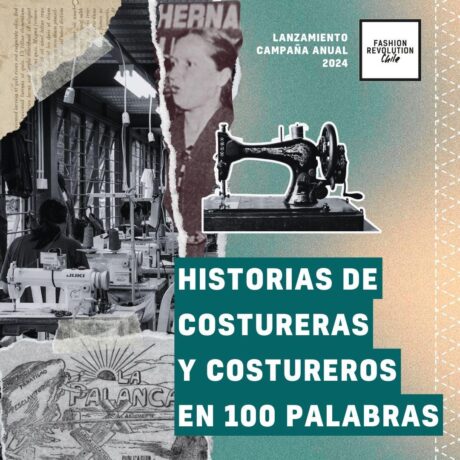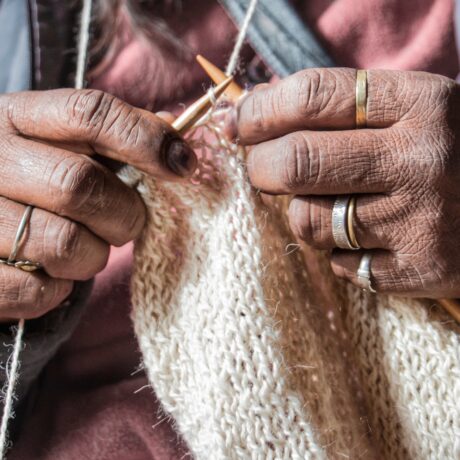Thanapara Swallows Development Society: an Oasis of Fair Fashion
Thanapara, a small village on the borders of Bangladesh surrounded by mango tress and the Ganga river, is a place at the very end of the world. Probably no one would expect that a well-known organization, Thanapara Swallows, which cooperates with many foreign partners has a base here and employs dozens of local women in its garment workshop.
The organization Thanapara Swallows produces cotton clothes for prestigious brands such as People Tree from UK and the Fair Trade Company from Japan, as well as for my small e-shop TukTuki. All the products are made according to the rules of fair trade – with respect for the producers and the environment. When I visited Thanapara, the organization was just in the middle of the accreditation process. The workers were marking emergency exits, concreting the floor and improving other details required by the accreditors. In November 2013 Thanapara Swallows got the official World Fair Trade Organization mark, which declares that the production process is running in accordance to the ten fair trade principles.
When I saw what is happening behind a high wall at the end of the village for the first time, I thought it must be a miracle. The whole production process is completely by hand and the technologies reminded me museum exhibits. Wooden looms, smouldering fires under the pots with dyes, pedal sewing machines – the women from Thanapara Swallows are able to make the highest-quality products using these tools.
The crazy manufacturing process reminds me very much of the market in the nearest city, Sardah. Dozens of workers in colourful saris carry thread, cloth and products from one place to the other, spreading the fabrics on the roof to dry them and carrying the wood while their colleagues are just sleeping after lunch or breastfeeding children. The women from the Thanapara village comprise the vast majority of the workers.
The organization Thanapara Swallows is the biggest employer in the area and the only opportunity for the women from surrounding district to get a paid job. About two hundreds of them are employed in the workshop and about one hundred work at home. Dozens of experts are also employed in the development project which is run from the profits of production. The nursery and elementary school are just two of the projects contributing to local community development. Thanks to these projects, the women working in the workshop can be close to their children, come to breastfeed them during the lunch break and take them home from school.
There is a coil of thread at the beginning of the whole process. It is because cotton threads are the only product which is bought. The rest of the production is entirely carried out by hand in the Thanapara workshop. First of all the threads are dyed. The dyes are made in two big pots by a trial and error method. I had to laugh when I first saw the manager standing in front of the computer with a piece of cloth comparing its colour with the colour on the monitor. It was less humorous for me to look at the workers dying the threads in boiling water using two huge bamboo sticks, hanging them on every single free space to dry them and making bobbins. You need only a gorgeous wheel and two skilful workers to prepare the warp for a loom.
Weaving is said to be the most difficult and most glamorous work here. Pushing the treadle, binding the threads, counting the sequences is done enormously quickly and can be managed only by the most experienced workers.
The biggest room is used for sewing and embroidering. The women use mechanical pedal sewing machines, only three of them are electrical. On one hand the pedal machines are slower and get stuck from time to time. On the other hand you can keep sewing even if the electricity doesn’t work, which happens quite often here. The “Iron Man” is a penultimate link in the production chain. The worker of this poetical position does simply…ironing. At the very end of the production there is the oldest employee of Thanapara Swallows. The respected old woman is responsible for the quality control and no piece of cloth can be packed without her agreement.
Each product of Thanapara Swallows passed through the hands of dozens of men and women. It is unbelievable how cheaply the goods can be produced and sold. The reason is the very low level of salaries – the minimum wage in the garment industry is 5300 Bangladeshi Taka, about 50 Euros. The workers in Thanapara Swallows workshop are paid according to their productivity. The most skilful can earn more than two minimum wages a month. The money is enough to live on, buy school supplies for children and maybe even to save something. The organization also administers a fund helping the employees in case of illness or inability to work. It is the community way of management which transfers a garment factory into the fair trade workshop. All workers can decide about important aspects of the organization and everybody can also benefit from the organization’s earnings and services. Even if the working conditions and standards are incomparable to our perception of “decent labour” the situation is getting better and better. This is thanks to the dialogue of the management and employees, as well as thanks to the independent controls of World Fair Trade Organization and other partners.










